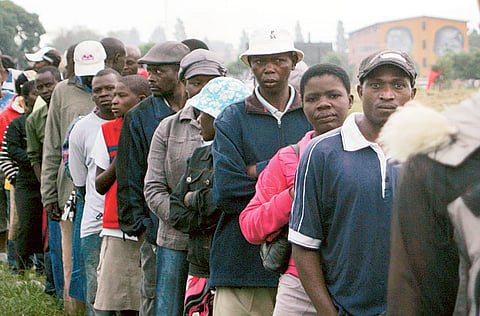Armed kidnapping mars Zimbabwe referendum
Gunmen abduct an ally of Tsvangirai during voting for new constitution

Harare: Gunmen abducted an ally of Zimbabwean Prime Minister Morgan Tsvangirai on Saturday, his party said, as the country voted on a new constitution amid seething political tensions.
Samson Magumura, a regional official from Tsvangirai’s Movement for Democratic Change, was seized at his home southeast of Harare shortly before dawn, according to party spokesman Douglas Mwonzora.
“Our district secretary for Headlands was kidnapped this morning. He was taken from his home by armed people,” Mwonzora said.
Magumura’s whereabouts remain unknown.
The MDC suggested his assailants, four armed men driving a white four wheel drive, where linked to President Robert Mugabe’s ZANU-PF party.
The gunmen also seized a telephone from Magumura’s wife during the attack, the party said.
The incident came as polls opened in a key referendum on a new constitution that would curb 89-year-old Mugabe’s powers and pave the way for fresh elections.
The text is supported by both Mugabe and Tsvangirai. A “yes” vote is widely expected but political tensions seethed beneath the surface.
Casting his ballot a few hours after polls opened, Tsvangirai expressed hope that a positive outcome would help catapult the country out of crisis.
“I hope it sets in a political culture where we move from a culture of impunity to a culture of constitutionalism,” he said.
Around six million eligible voters are expected to cast ballots at 9,456 polling stations dotted across the impoverished southern African country.
Official results of the referendum are expected to be released within five days of the vote. Polling stations will close at 1700 GMT.
But turnout was slow at many polling stations early on Saturday.
School teacher Petronella Dzikiti said she voted in favour of the new constitution, in part because it would introduce presidential term limits.
“We don’t want a situation like we have today, where some of us knew one leader as a child who remains there when we are grown-ups,” the 36-year-old said outside a polling station in Chitungwiza, near the capital.
The new constitution would for the first time put a definite, if distant, end date on Mugabe’s 33-year rule.
Presidents would be allowed to serve two terms of five years each, meaning that, elections permitting, Mugabe could rule until 2023, by which time he would be 99-years-old.
The text would also strip away presidential immunity after leaving office and bolster the independence and power of parliament and the courts.
It would also set up a peace and reconciliation commission to take care of post-conflict justice and healing.
Mugabe and Tsvangirai’s joint support for the draft constitution has resulted in an uneasy truce.
Two people died in separate firebomb attacks in the run-up to the referendum, while several MDC members, including a parliamentary candidate, were beaten up on the eve of the vote as they were putting up posters backing the draft constitution.
The authorities have also been accused of targeting pro-democracy groups by arresting their leaders and seizing equipment.
But violence has not approached the levels seen in the disputed 2008 election, when at least 180 people were killed and 9,000 injured in unrest that prompted the international community to force Mugabe and Tsvangirai into a coalition government.
A general election slated for July is likely to end that often acrimonious power-sharing arrangement.
Rights groups fear the government harassment seen ahead of the referendum vote could be a prelude to a more serious crackdown on opponents in the run-up to the general election.
Observers also fear there will not be enough time to apply all the necessary reforms to ensure a healthier political environment before the next elections.
They also say people have not had much opportunity to debate and digest the text before voting, leaving citizens in the dark about what the vote will mean for the country.
In Harare’s flashpoint township of Mbare, where violence broke out on Friday, Felistas Muridhini was one was one of dozens lining up to vote.
The 34-year-old mother said she had voted in favour of the draft.
“I have been following the drafting of the constitution. I voted yes, because I was acting on my party’s orders,” she said.
The National Constitutional Assembly, a non-governmental group, wants to see the new constitution rejected, arguing that if anything it grants Mugabe more unfettered powers than before.


